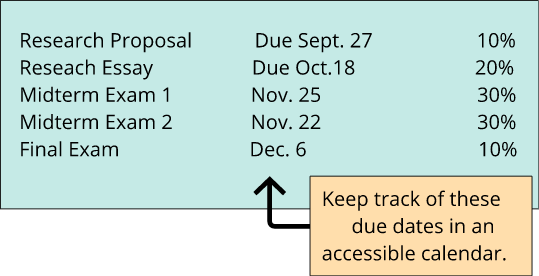7 Analyze Your Course Presentation
A Course Presentation (also called a syllabus or course outline) is prepared by your instructor, and is like a roadmap for your learning journey ahead. You will want to look at your course Moodle page before the course starts to see if it is available to you. If not, you will receive it on the first day of class. Sometimes, instructors will email them to you in advance.
Course presentations include the following:
- Course Description:
Description from the Course Outline, plus anything else the Instructor would like you to know about the overall intention of this course.
This is the general overview of what you will be doing in this course.
- Contact Information:
Instructor name, email, phone, classroom, office hour times, office location.
This should contain all the information you need to contact your instructor when you need to ask questions, meet with them, or share information with them.
- Course Materials:
Required and Additional Materials. These may include: reference to handouts, library materials that are used in the course, or other materials.
You will need all of these items. Get them from the indicated sources. To start your semester off in the best possible, you will want to purchase or rent any required textbooks before the first day of class.
- Tentative Schedule of Topics, Classes, and Assignments (may change):
Including times, attendance requirements, external activities, field trips, etc.
This information should go into your scheduling device (planner, calendar, online schedule, etc.). In the next chapter, you will learn strategies to create a semester and weekly schedule based on the information in your course presentation.
- Assignments:
Assignments and due dates specified, may include rubrics/checklists.
Assignment due dates need to be scheduled in advance so you can plan your work, research, and study. Your course presentation may also include some guidelines and rubrics that indicate what is required for each assignment, and how the assignments will be graded. Rubrics and checklists must be referenced for projects to ensure that you meet the specified criteria.
- Tests and Exams:
Exam dates, may include other ways that testing will be done.
Put these test dates into your calendar as soon as you receive them. You will use this information to plan your study times, so you are well prepared for any tests, and can avoid cramming at the last minute.

- Policies:
Kwantlen Polytechnic University policies regarding class conduct, evaluation, testing, late assignments, and plagiarism are observed for all courses. Everyone at KPU must comply with the policies laid out. Make sure you understand any policies that are mentioned in your course presentation.
By getting to know your course presentation, you can help to prepare yourself to meet the expectations of the semester ahead.
Try It!
Find a course presentation for one of your classes. You can find these on Moodle by logging in to courses.kpu.ca with your student number and password. Try to find the following information:
- How to contact your instructor.
- What textbooks or course materials you will need before the first day of class.
- What assignments you will need to complete and what will be required.
- When your tests and exams are scheduled.
If you have any questions about what you read, e-mail your instructor, or plan to visit them in their office hours.
Download a printable worksheet to guide you through this process.

